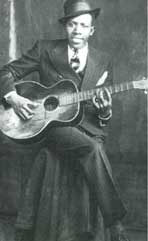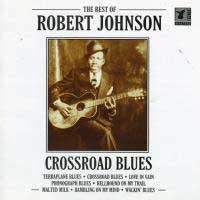
Robert Johnson–Studio Portrait. Hooks Bros., Memphis, 1935. Copyright 1989 Delta Haze Corporation. All Rights Reserved. Used by Permission
Major Works
- Kind Hearted
- I Believe I’ll Dust My Broom
- Sweet Home Chicago
- Rambling On My Mind
- Phonograph Blues
- They‘re Red Hot
- Dead Shrimp Blues
- Preaching Blues
- I’m a Steady Rollin’ Man
- From Four Till Late
- Little Queen of Spades
- Malted Milk
- Drunken Hearted Man
- Stop Break in Down Blues
- Honeymoon Blues
- Love In Vain
Robert Johnson: A Biography
by Terry Johnson (SHS)

Terry Johnson, SHS Researcher
Robert Johnson, the songwriter, guitarist, and singer was known as “The King of the Delta Blues.” Robert Johnson was born in Hazlehurst, Mississippi, on May 8, 1911 to Julia Major Dobbs and Noah Johnson. There was another man by the name of Charles Dobbs, who was Robert’s stepfather. Neither his natural father nor his stepfather wanted to help Robert in any way (Awmiller 36). One source says, “Until his late adolescence, his name was Robert Spencer after his stepfather, who had to change his name from Dobbs to Spencer when he ran from Mississippi after a personal vendetta with the Marchetti Brothers” (Lavere 7). According to Awmiller, “At different times he called himself R.L. Spencer as well as many other names. Once he adopted the name Johnson he falsely claimed to be a relative of Lonnie Johnson, a famous guitarist” (Awmiller 36). It was almost as if he thought he could give himself the personal attention that he did not receive in real life by using these false names and family.
When Robert was a teenager, he would grab older musicians’ instruments and try to play them. Johnson was not gifted with a natural talent for guitar. According to Awmiller, the legendary Eddie “Son” House taught Johnson to play. House taught Robert the basics of blues guitar and more things, which he used throughout his life. House really encouraged Johnson to take his music seriously and to go for his goal and become a professional musician (Awmiller 37).
Johnson traveled throughout the South playing in small clubs, juke joints and gatherings. He was always on the move looking for his next gig. Johnny Shines, who is a musician, met Johnson in 1935 and traveled with him. Johnny says, “Robert Johnson was a rambling man who was ready to hop a freight at the drop of a hat.” He continues, “He was a natural rambler” (Bianco 3 of 5). Johnson traveled to any place he could, from town to town playing the blues. He hitched rides on trains, rode on back of trucks, and sometimes he made enough money to buy a bus ticket. According to Bianco, “Robert was probably influenced by early artist Skip James who was recorded in 1931” (Bianco 1).
 Many of Robert’s songs help reveal the kind of life he led. There was a myth about Robert selling his soul to the devil in a crossroads bargain. People believed that Robert had sold his soul to the devil in exchange for learning how to play (Bianco 127). On the other hand, Awmiller says that it was House who taught Robert to play so well. Although, according to Bianco, “Johnson never confirmed the story” (Bianco 127). Some referred to this rumor as the “Black Arts.”
Many of Robert’s songs help reveal the kind of life he led. There was a myth about Robert selling his soul to the devil in a crossroads bargain. People believed that Robert had sold his soul to the devil in exchange for learning how to play (Bianco 127). On the other hand, Awmiller says that it was House who taught Robert to play so well. Although, according to Bianco, “Johnson never confirmed the story” (Bianco 127). Some referred to this rumor as the “Black Arts.”
There are at least three versions explaining how and why Robert Johnson was killed. Robert became too close or too friendly with the companion of the man who hired him to play, and the man poisoned Johnson with whiskey. August of 1938, Robert Johnson and Honeyboy Edwards were playing at a house party in Three Forks, Mississippi. One version says Johnson was “stabbed to death by a jealous husband. ” Another version says he was “stabbed by a women or poisoned by parties unknown.” Whatever the case, Johnson died three days later at the age of twenty-seven. According to Johnny Shine, “I heard that it was something to do with the Black Arts. Before he died, Robert was crawling along the ground on all fours; barking and snapping like a mad beast. That’s what the poison done to him” (Bianco 126).
Johnson was buried in a small cemetery on the edge of town. The “King of the Delta Blues” was gone, but today his music remains popular. Love in Vain: : A vision of Robert Johnson by Alan Greenberg is a screenplay, for an as yet unmade movie about him, that dramatizes his life, music and legend.. The movie Crossroads is about Robert Johnson and Willie Brown (Johnson sings about his ‘friend-boy, Willie Brown in his Cross Roads Blues) and stars Joe Seneca and Ralph Machio. Robert Johnson is considered one of the greatest of the Mississippi Delta blues musicians.
Timeline
- 1911–May 8, – Robert Johnson was born in Hazlehurst, Mississippi
- 1930–Johnson disappeared and returned with a guitar.
- 1931–Johnson became good at playing the guitar.
- 1935– Johnny Shine and Johnson traveled together.
- 1936-1937 – Johnson had two recording sessions.
- 1938– Robert Johnson died of poisoning in Three Forks, Mississippi
- 1951 -Muddy Waters and Elmore James recorded Johnson’s Dust My Broom.
- 1961 – Johnson’s first album becomes popular.
- 1969 – The album was reissued.
- 1970 – A second album followed.
- 1980 – Inducted into the Blues Hall of Fame
- 1986 – Inducted into the Rock and Roll Hall of Fame
- 2006 – Awarded Grammy Lifetime Achievement Award
- 2017 – Inducted into the Mississippi Arts + Entertainment Experience Hall of Fame
Related Websites
- Rock and Roll Hall of Fame: Robert Johnson
- On November 23, 1936, Robert Johnson recorded his songs for the first time in San Antonio,Texas. This first of two sessions was unceremoniously squeezed between W.Lee O’Daniel & His Hillbilly Boys the day before.
- Lesson plan for teaching the poetry of Robert Johnson’s songs.
Bibliography
- wmiller, Craig. “Robert Johnson.” This House on Fire. New York: Franklin Watts. 1996. 36-43.
- Bianco, David. “Artist Biography: Robert Johnson.” On Line. World Wide Web. Available http://www.musicblvd.com/cgi-bin/tw/1856512894383366_105_210499
- Bianco, David.” Robert Johnson singer, guitarist and composer. “Contemporary Musician. Volume 6.
- “Robert Johnson Biography.” http://xroad. virginia.edu/~CAP New nav /blues/vjbio.htm/
